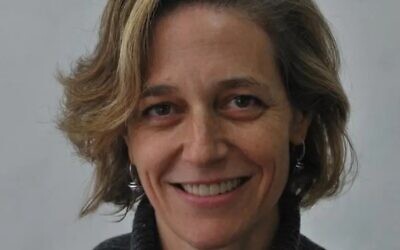A top Health Ministry on Sunday presented details on a government plan to gradually lift the current coronavirus lockdown, dubbing it a “strategy for preventing the next lockdown,” and said that schools will not be reopened next week.
Sharon Alroy-Preis, acting head of the ministry’s public health services division, said that the latest figures indicating a slowdown in infections were “encouraging,” but noted that they were from the weekend, when testing levels typically plummet.
“We still don’t think we’ve reached the goal. We’ll see the figures from today and tomorrow and they will be more representative. There had been a continuous increase in serious patients until the lockdown, and now that is stabilizing. There are initial signs of control over the outbreak,” Alroy-Preis said.
“We hope that with the control over morbidity, the number of deaths and critical patients will drop,” she added.
Alroy-Preis said schools will likely not reopen next Sunday, when the restrictions are expected to be lifted.
“We are aware that workplaces cannot be opened without kindergartens and grades 1-4 [also opening],” she said. “We are doing this in a measured, cautious fashion so that we don’t need to go back.”
She said the nine-step plan for lifting the lockdown would be gradual and that at least two weeks would pass between implementing each phase, in addition to infection levels going down.

Sharon Alroy-Preis. (Courtesy)
The first stage will be implemented when the national daily tally dips below 2,000 cases, with the ministry giving an estimated date of October 18 (the planned date for each stage is two weeks after the previous one). It will scrap the one-kilometer restriction on movement for non-essential needs, including for protests, beaches will be opened, and family members living in different homes will be allowed to meet.
In the second stage, when daily infection levels reach 1,000, grades 1-4 will open, synagogues will be allowed to operate under restrictions, and the alternative medicine industry will be allowed to resume.
The third stage — when there are just 500 daily cases — will see workplaces that receive customers resume operations, along with stores, shopping malls, markets and gyms. The next phase, at 250 daily cases, will allow entertainment attractions, restaurants and cafes to reopen.
The fifth stage (no specific target number of cases was given) will reopen hotels, guest houses and swimming pools. The sixth will reopen the culture industry, museums and group sports. The seventh will see grades 5-12 go back to school, the eighth will open event venues and amusement parks, and the last phase — planned for late January — will reopen nightclubs and bars and allow crowds back into stadiums for sports events.
“We will wait at least two weeks between every two steps. We saw what happened in the previous [lockdown] when we reopened many things simultaneously and we must not repeat that mistake,” Alroy-Preis said.
She also urged localized restrictions focusing on high-infection areas, which have been slammed by many in the ultra-Orthodox community, where morbidity rates are significantly higher than in the rest of Israel.

Prime Minister Benjamin Netanyahu, right, and Defense Minister Benny Gantz hold a press conference in Tel Aviv on July 27, 2020. (Tal Shahar/Pool/Flash90)
Defense Minister Benny Gantz said Sunday evening that his Blue and White party would insist that small businesses that are not customer-facing be allowed to open this week, and that it would not approve the extension of the government’s emergency powers when they expire Wednesday, which would allow the mass protests against Prime Minister Netanyahu to resume.
“All this is on the condition that the morbidity trends continue to decline,” he said in a video statement.
While welcoming the decline in new coronavirus cases, Gantz acknowledged the “high price” paid by Israelis during the lockdown.
Shortly after that, Channel 12 news reported that Netanyahu would not push for the emergency measures to be extended.
Netanyahu said earlier that, though there are signs the restrictions are bringing down infection rates, “we need a few more days to consider” easing the closure.
Defending the lockdown, Netanyahu said it “saved us from an exponential rise in morbidity, mortality, and seriously sick people,” but warned it was too early to believe the fight against COVID-19 is over.
When the restrictions are lifted, Netanyahu said, “We’ll open businesses with up to 10 employees that don’t receive customers [in person], we’ll open preschools.” He stressed, however, that “we’ll gradually do this in different stages, with caution and with clear measurements for moving from stage to stage.”
He called on Israelis to continue adhering to the virus restrictions.
“If we act correctly, we’ll defeat the disease,” he declared.
The current lockdown, Israel’s second since the pandemic started, began on September 18 before Rosh Hashanah and was tightened a week later.
It has been marked by clashes between enforcing police and ultra-Orthodox protesters, as well as between police and anti-government protesters who are calling for Netanyahu’s resignation, due to his ongoing corruption trial and the government’s handling of the virus outbreak.
Times of Israel staff contributed to this report.
Related posts:
Views: 0
 RSS Feed
RSS Feed

















 October 12th, 2020
October 12th, 2020  Awake Goy
Awake Goy  Posted in
Posted in  Tags:
Tags: 
















